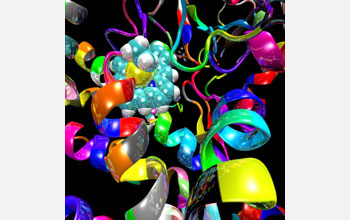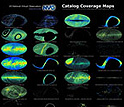News Release 07-128
NSF Announces $26 Million Solicitation for Projects That Advance Innovative Computational Thinking
Total cyber-enabled discovery and innovation spending to reach $52 million this year

Protein-binding model of cytochrome P450, a heme enzyme responsible for drug metabolism in the body.
October 1, 2007
This material is available primarily for archival purposes. Telephone numbers or other contact information may be out of date; please see current contact information at media contacts.
The National Science Foundation (NSF) announced a solicitation for projects to advance innovative computational thinking, the newest multidisciplinary, multiyear initiative called Cyber-Enabled Discovery and Innovation (CDI).
CDI research outcomes are expected to produce paradigm shifts in our understanding of a wide range of science and engineering phenomena and socio-technical innovations that create new wealth and enhance the national quality of life.
Funding for this first project will range from $26 to $52 million, NSF's commitment to the CDI initiative for fiscal year 2008, and is expected to grow $50 million in each of the next five years. With this investment, NSF wishes to attract researchers to create revolutionary science and engineering research outcomes made possible by innovations and advances in "computational thinking," defined comprehensively as computational concepts, methods, models, algorithms, and tools.
CDI seeks ambitious, transformative, multidisciplinary research proposals within or across the following three thematic areas:
- From data to knowledge: enhancing human understanding and generating new knowledge from a wealth of heterogeneous digital data
- Understanding complexity in natural, built, and social systems: deriving fundamental insights on systems comprising multiple interacting elements
- Building virtual organizations: enhancing discovery and innovation by bringing people and resources together across institutional, geographical and cultural boundaries
A competitive CDI proposal will:
- describe an ambitious research and/or education agenda that, through computational thinking, promises paradigm-shifting advances in more than one field of science or engineering;
- provide a compelling rationale for how innovations in, and/or innovative use of, computational thinking will yield the desired project outcomes; and
- draw on productive intellectual partnerships that capitalize on synergies of knowledge and expertise in multiple fields or sub-fields of science or engineering, and/or in multiple types of organizations, including foreign and domestic academic, for-profit, and not-for-profit entities.
For additional information about CDI, please visit http://www.nsf.gov/crssprgm/cdi/index.jsp.
-NSF-
-
An astronomical catalog sample object distribution, accessible via the National Virtual Observatory.
Credit and Larger Version
Media Contacts
Lisa-Joy Zgorski, NSF, (703) 292-8311, email: lisajoy@nsf.gov
Dana W. Cruikshank, NSF, (703) 292-8070, email: dcruiksh@nsf.gov
Program Contacts
Sirin Tekinay, NSF, (703) 292-8080, email: cdi@nsf.gov
Eduardo A. Misawa, NSF, (703) 292-8080, email: cdi@nsf.gov
Thomas F. Russell, NSF, (703) 292-8080, email: cdi@nsf.gov
The U.S. National Science Foundation propels the nation forward by advancing fundamental research in all fields of science and engineering. NSF supports research and people by providing facilities, instruments and funding to support their ingenuity and sustain the U.S. as a global leader in research and innovation. With a fiscal year 2023 budget of $9.5 billion, NSF funds reach all 50 states through grants to nearly 2,000 colleges, universities and institutions. Each year, NSF receives more than 40,000 competitive proposals and makes about 11,000 new awards. Those awards include support for cooperative research with industry, Arctic and Antarctic research and operations, and U.S. participation in international scientific efforts.
Connect with us online
NSF website: nsf.gov
NSF News: nsf.gov/news
For News Media: nsf.gov/news/newsroom
Statistics: nsf.gov/statistics/
Awards database: nsf.gov/awardsearch/
Follow us on social
Twitter: twitter.com/NSF
Facebook: facebook.com/US.NSF
Instagram: instagram.com/nsfgov

